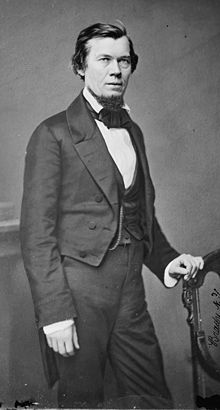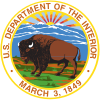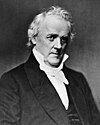Jacob Thompson
Jacob Thompson | |
|---|---|
 Thompson between 1855 and 1865, byMatthew Brady | |
| 5thUnited States Secretary of the Interior | |
| In office March 10, 1857 – January 8, 1861 | |
| President | James Buchanan |
| Preceded by | Robert McClelland |
| Succeeded by | Caleb Smith |
| Member of theU.S. House of Representatives fromMississippi's1stdistrict | |
| In office March 4, 1847 – March 3, 1851 | |
| Preceded by | Constituency established |
| Succeeded by | Benjamin D. Nabers |
| Member of theU.S. House of Representatives fromMississippi'sat-largedistrict | |
| In office March 4, 1839 – March 3, 1847 Seat A | |
| Preceded by | Thomas J. Word |
| Succeeded by | Constituency abolished |
| Personal details | |
| Born | May 15, 1810 Leasburg, North Carolina,U.S. |
| Died | March 24, 1885(aged 74) Memphis, Tennessee,U.S. |
| Resting place | Elmwood Cemetery |
| Political party | Democratic |
| Spouse | Catherine Jones |
| Education | University of North Carolina, Chapel Hill(BA) |
| Signature | |
Jacob Thompson(May 15, 1810 – March 24, 1885) was theUnited States Secretary of the Interior,who resigned on the outbreak of theAmerican Civil Warand became the Inspector General of theConfederate States Army.
In 1864,Jefferson Davisasked Thompson to lead a delegation to Canada, where he appears to have been leader of theConfederate Secret Service.From here, he is known to have organised many anti-Union plots and was suspected of many more, including a possible meeting with Lincoln's assassin,John Wilkes Booth.
Union troops burned down his mansion inOxford, Mississippi,the hometown ofWilliam Faulkner,who based some of his fictional characters on Thompson.
Early life[edit]
This sectionneeds additional citations forverification.(April 2023) |
Born inLeasburg, North Carolinain 1810 to Nicolas Thompson and Lucretia (van Hook) Thompson,[1]Thompson attended Bingham Academy inOrange County, North Carolinaand later went on to graduate from theUniversity of North Carolinain 1831, where he was a member of thePhilanthropic Society.Afterwards, he served on the university faculty for a short time until he left to study law in 1832. He was admitted to the bar in 1834 and established a law practice inPontotoc, Mississippiin 1837, and made an unsuccessful bid to become the state attorney general.

From left to right: Jacob Thompson,Lewis Cass,John B. Floyd,James Buchanan,Howell Cobb,Isaac Toucey,Joseph HoltandJeremiah S. Black,(c. 1859)
Congressional years[edit]
Thompson's involvement in politics began in earnest as he was elected to the26th Congress,serving through to the31st Congress(1849–1851).
He was appointed to theUnited States Senatein 1845 but never received the commission, and the seat went toJoseph W. Chalmers.Thompson was the chairman of theCommittee on Indian Affairsin the29th Congress.He lost reelection to the32nd Congressand went back to practicing law in Mississippi. In 1853, whenPresident Franklin Pierceoffered him to become aU.S Consul to Havanahe refused it. Thompson lost the1855 senate electiontoJefferson Davis,but in 1857, newly electedPresidentJames Buchananappointed ThompsonUnited States Secretary of the Interiorfrom 1857 to 1861.[2][3]
In the later years of theBuchanan administration,the cabinet members argued with one another on issues ofslaveryandsecession.[citation needed]In an 1859 speech, Thompson advanced a moderate unionist position. He denouncedRepublicansin the North who spoke of the slavery issue as an "irrepressible conflict" and Southern extremists who favored reopening theAtlantic slave trade.[4]
Alignment with Confederacy[edit]
While still serving as Interior Secretary, Thompson was appointed by the state of Mississippi as a "secession commissioner" to North Carolina and tasked to convince that state to secede from the Union in the wake of the1860 presidential election.On December 17, he passed throughBaltimoreon the way to North Carolina. "Secretary Thompson has entered openly into the secession service, while professing still to serve the Federal authority," theNew York Timesreported on December 20.[5]The next day, Thompson met with GovernorJohn W. EllisinRaleigh.He wrote an open letter to Ellis which was published in theRaileigh State Journalon December 20. Thompson wrote that the South faced "common humiliation and ruin" if it remained in the Union. He warned that a Northern "majority trained from infancy to hate our people and their institutions" would overthrow slavery. The result would be "the subjugation of our people."[6]
Thompson resigned as Interior Secretary in January 1861. When he resigned,Horace Greeley'sNew-York Daily Tribunedenounced him as "a traitor", remarking, "Undertaking to overthrow the Government of which you are a sworn minister may be in accordance with the ideas of cotton-growing chivalry, but to common men cannot be made to appear creditable."[7]
Thompson becameInspector Generalof theConfederate States Army.Though not a military man, Thompson later joined the army as an officer and served as an aide to GeneralP.G.T. Beauregardat theBattle of Shiloh.[citation needed]
He attained the rank of lieutenant colonel and was present at several other battles in theWestern Theaterof the war, including Corinth, Vicksburg, and Tupelo.[citation needed]
Commissioner in Canada[edit]
This sectionrelies largely or entirely on asingle source.(November 2017) |
In March 1864,Jefferson Davisasked Thompson to lead a secret delegation in Canada. He accepted and arrived in Montreal in May of that year. Thompson appears to have been the leader ofConfederate Secret Serviceoperations in Canada.
From there, he directed a failed plot to free Confederate prisoners of war onJohnson's Island,offSandusky, Ohio,in September. He also arranged the purchase of a steamer, with the intention of arming it to harass shipping in theGreat Lakes.Regarded in the North as a schemer and conspirator, many devious plots were associated with his name, though much of this may have been public hysteria.
On June 13, 1864, Thompson met with former New York GovernorWashington HuntatNiagara Falls.[8]According to the testimony of the Peace DemocratClement Vallandigham,Hunt met Thompson, talked to him about creating a Northwestern Confederacy, and obtained money for arms, which was routed to a subordinate. Thompson gaveBenjamin Wood,the owner of theNew York Daily News,money to purchase arms.[9]
One plot was a planned burning ofNew York Cityon November 25, 1864 in retaliation for Union GeneralsPhilip SheridanandWilliam Tecumseh Sherman'sscorched-earthtactics in the South.[10]
Some speculate thatJohn Wilkes Booth,who assassinatedAbraham Lincoln,met Thompson, but that has not been proved. (In the years after the war, Thompson worked hard to clear his name of involvement in the assassination.) His manor, called "Home Place," inOxford, Mississippiwas burned down byUniontroops in 1864.
Postwar[edit]
After theCivil War,Thompson fled to England and later returned to Canada as he waited for passions to cool in the United States. He eventually came home and settled inMemphis, Tennessee,to manage his extensive holdings. Thompson was later appointed to the board of theUniversity of the Southat Sewanee and was a great benefactor of it.
Death[edit]
Jacob Thompson died inMemphis, Tennesseeand was interred inElmwood Cemetery.[11]Republicans and Union veterans condemned theGrover Clevelandadministration's lowering of flags tohalf-mastin Washington andSecretary of InteriorLucius Quintus Cincinnatus Lamar II's closure of theDepartment of Interiorto honor Thompson after his death.[12][13]
In popular culture[edit]
- A self-igniting liquid, referred to as "Greek fire" inSeason 1 Episodes 7–11of theBBC Americatelevision seriesCopper,is featured as part of a plot byConfederate Secret Serviceagents to burn downNew York City.
References[edit]
- ^College, Dickinson.""Thompson, Jacob"".House Divided: The Civil War Research Engine at Dickinson College.Dickinson College.RetrievedAugust 30,2020.
- ^"Jacob Thompson (1857–1861) | Miller Center".October 4, 2016.
- ^"THOMPSON, Jacob | US House of Representatives: History, Art & Archives".
- ^Dew 2001,p. 31.
- ^Dew 2001,p. 30.
- ^Dew 2001,pp. 31–32.
- ^New-York Daily Tribune,January 9, 1861, p. 4.
- ^p. 145, Castleman, John Breckenridge.Active Service.Louisville, KY: Courier-Journal Job Printing, 1917.
- ^p. 146, Castleman, John Breckenridge.Active Service.Louisville, KY: Courier-Journal Job Printing, 1917.
- ^p. 54, Benn Pitman. United States. Army. Military Commission (Lincoln Assassins: 1865).The Assassination of President Lincoln and the Trial of the Conspirators.Cincinnati, OH: Moore, Wilstach & Baldwin, 1865.
- ^"THOMPSON, Jacob | US House of Representatives: History, Art & Archives".history.house.gov.RetrievedMay 29,2022.
- ^"Ohio Republicans: The State Convention Declares for a High Protective Tariff. Denunciation of the Administration for Permitting" Rebels "to Hold Office. The Administration Condemned for Showing Respect to the Memory of Jacob Thompson. J. B. Foraker Nominated for Governor on the First Ballot-- Other Nomination".Daily American (Nashville, TN).June 12, 1885.
- ^"Editorial".New-York Tribune.March 28, 1885.
Bibliography[edit]
- Dew, Charles B.(2001).Apostles of Disunion: Southern Secession Commissioners and the Causes of the Civil War.Charlottesville, VA: University of Virginia Press.ISBN978-08139-3945-2.
External links[edit]
- United States Congress."Jacob Thompson (id: T000203)".Biographical Directory of the United States Congress.Retrieved on 2009-5-12
- The Jacob Thompson Collection (MUM00266)can be found in the William and Marjorie Lewis Collection at the University of Mississippi in the Archives and Special Collections.
- "Jacob Thompson".Find a Grave.RetrievedMay 12,2009.


